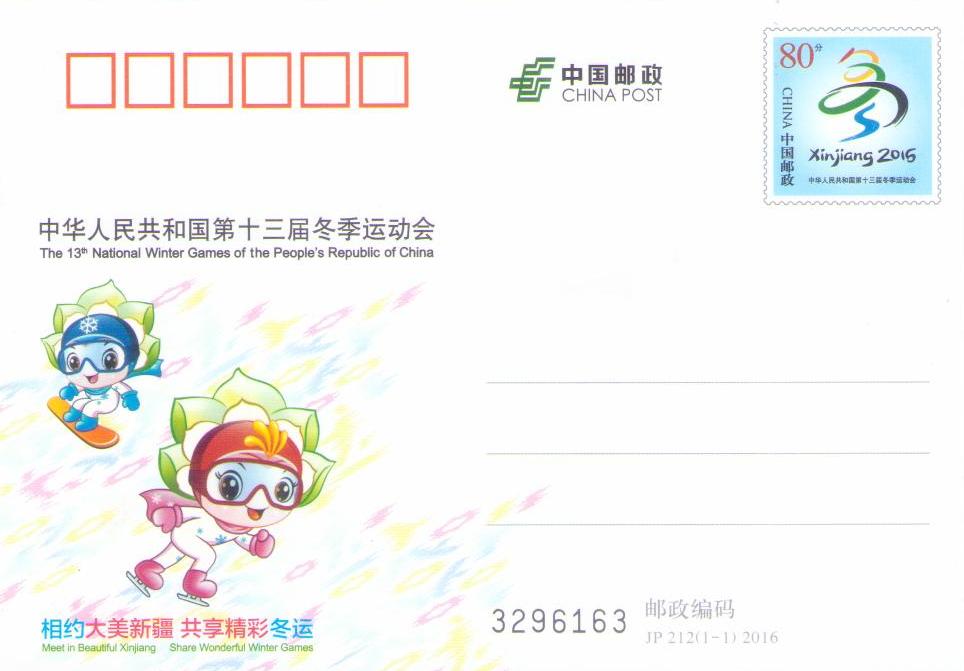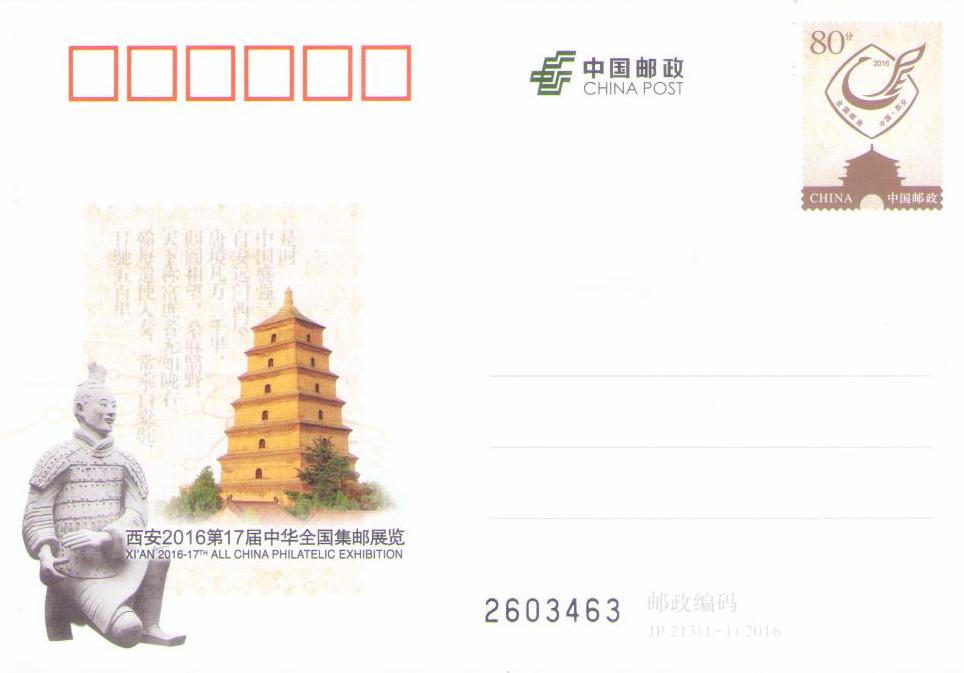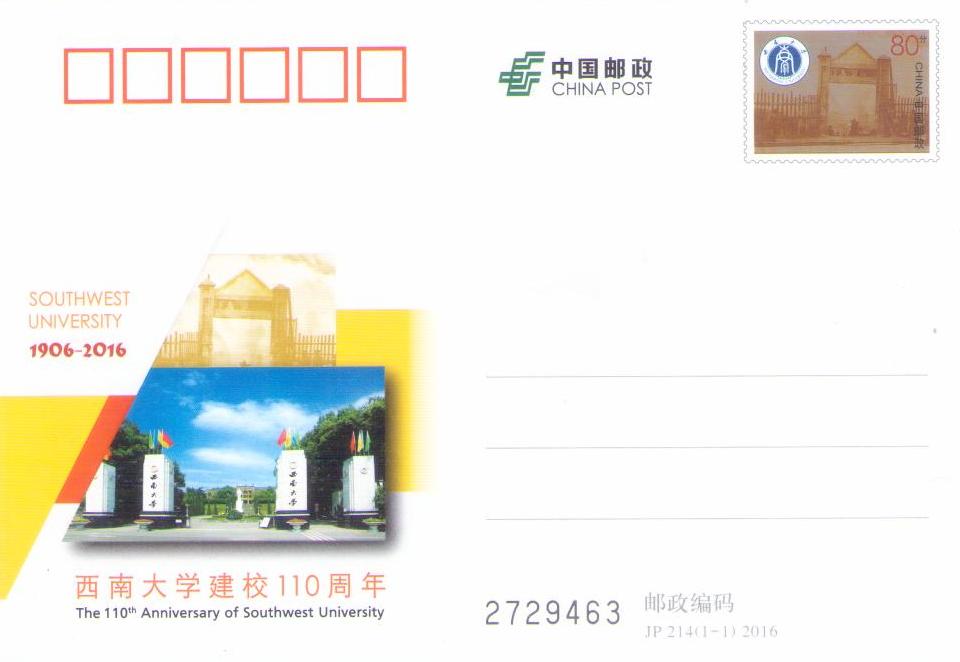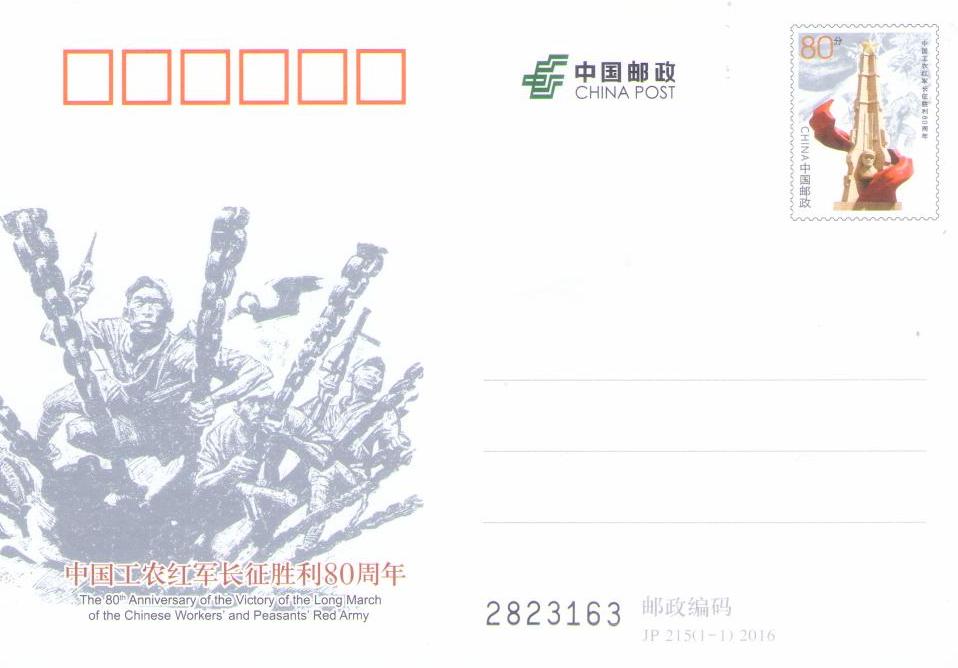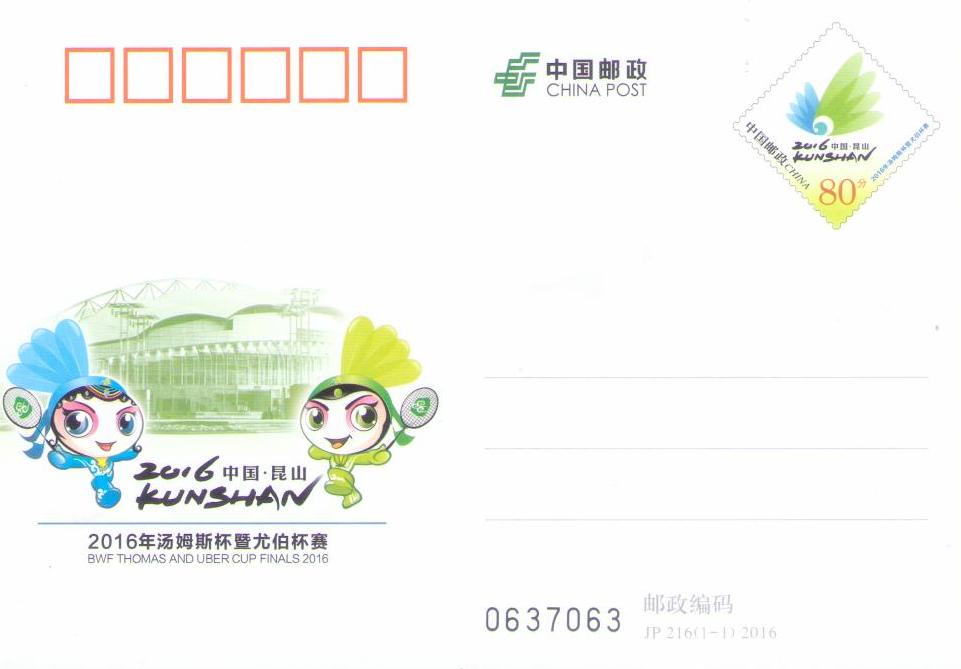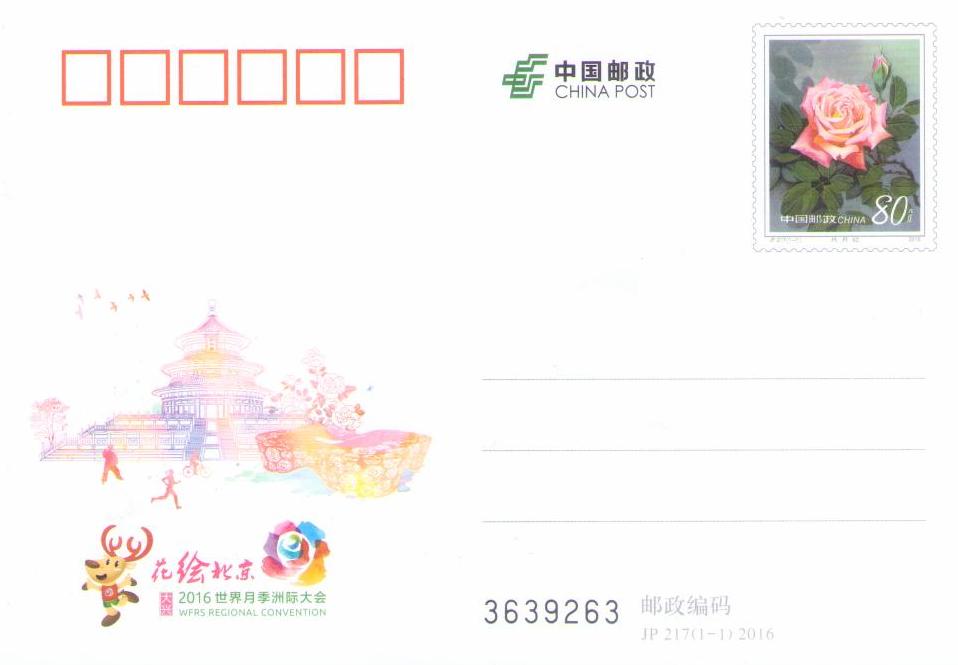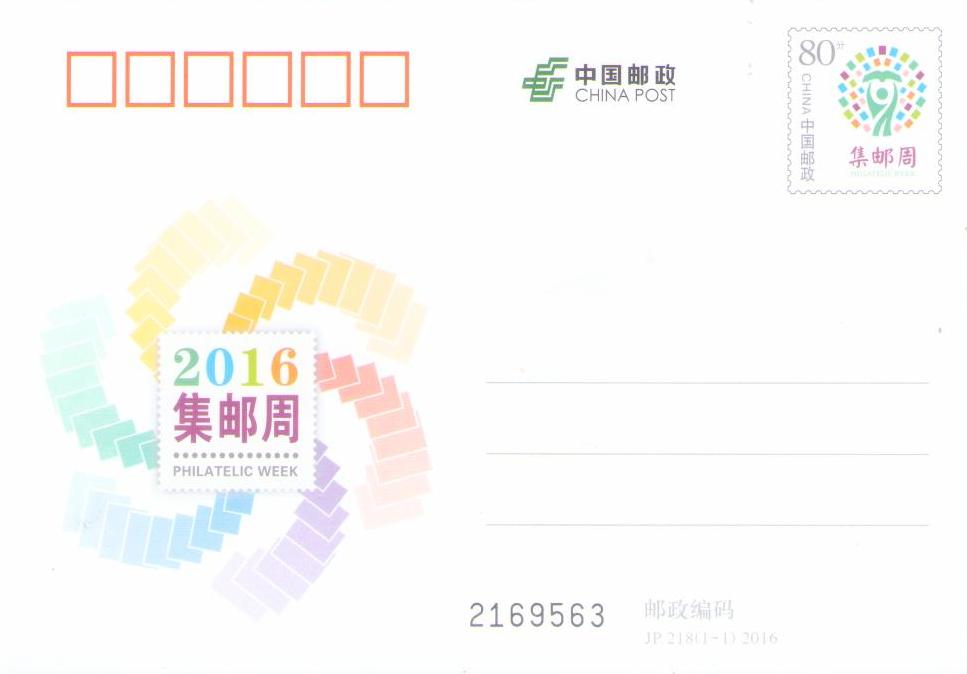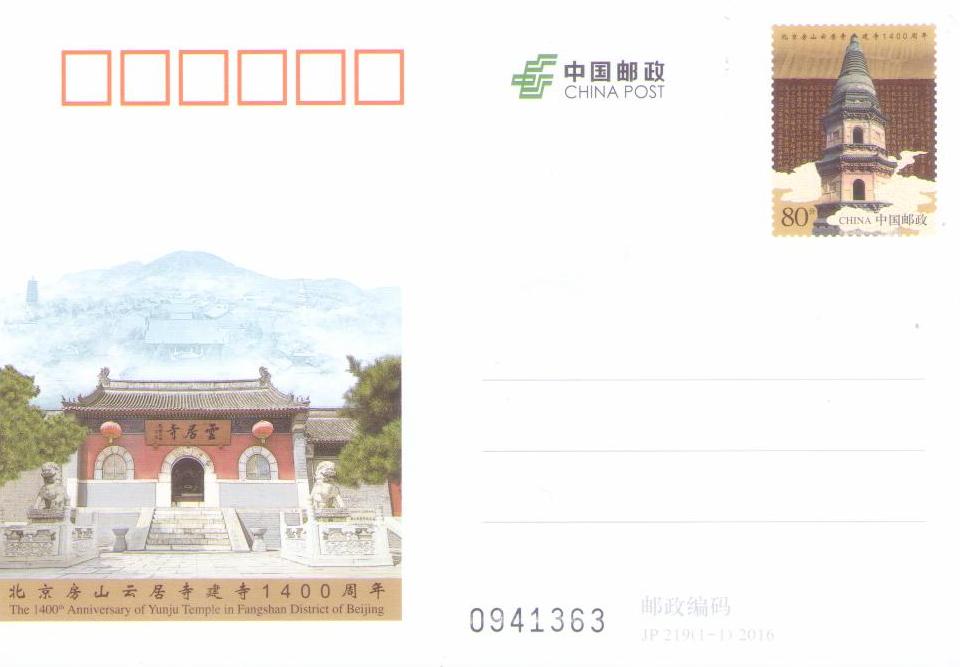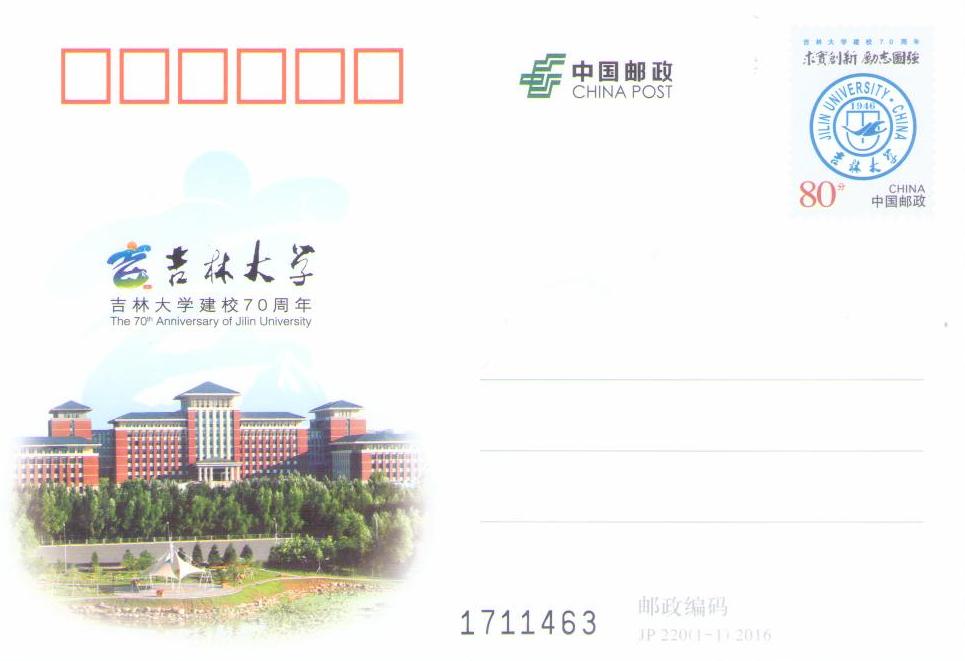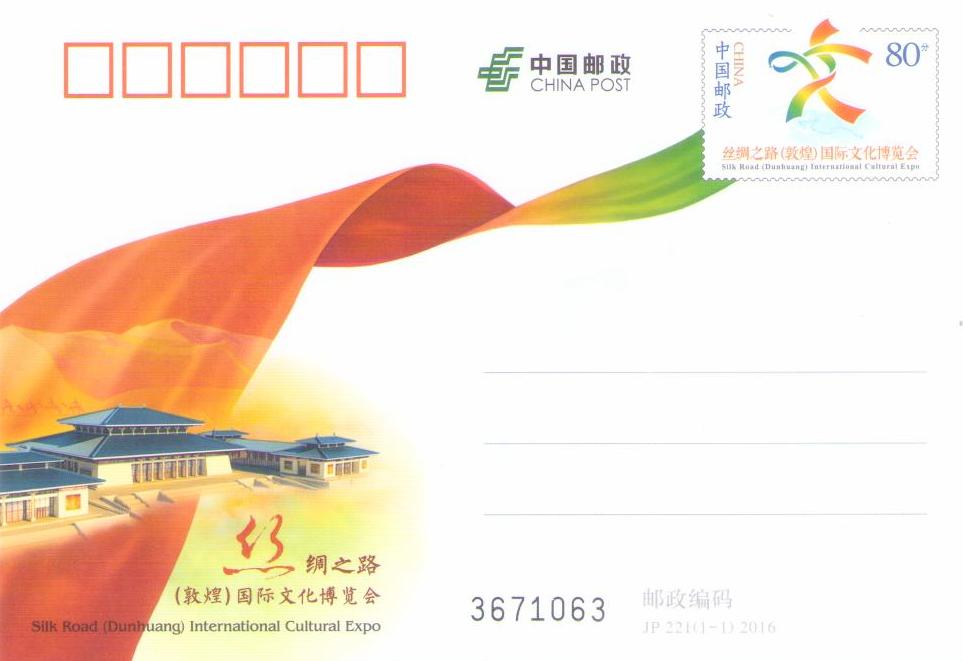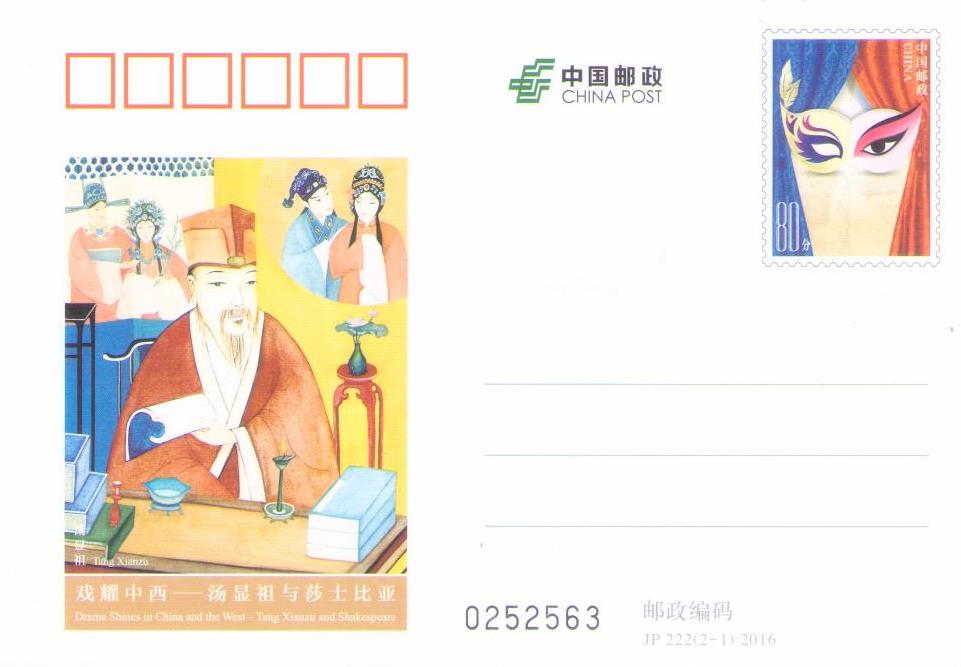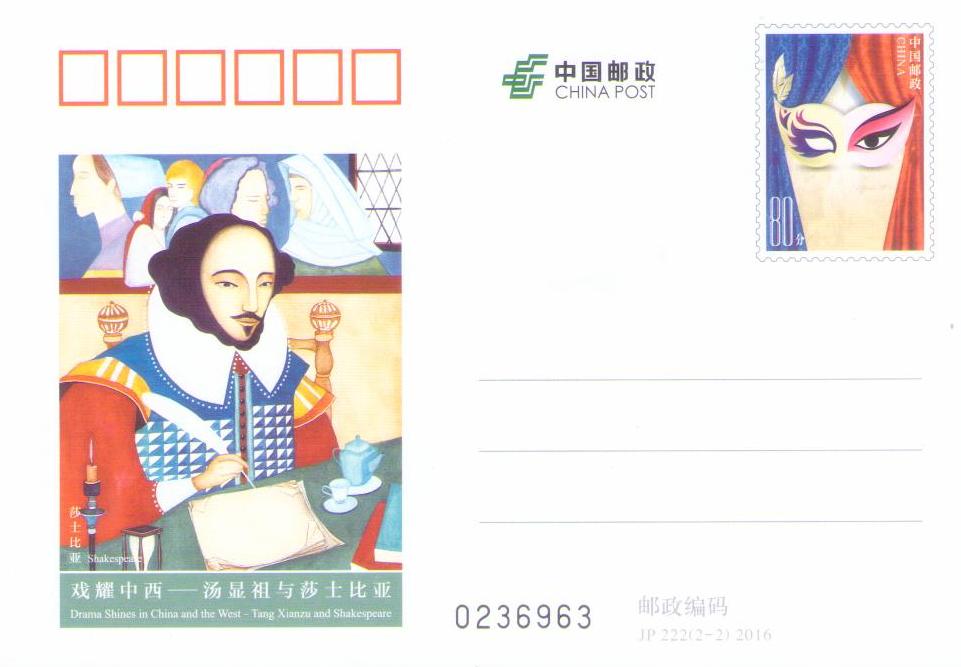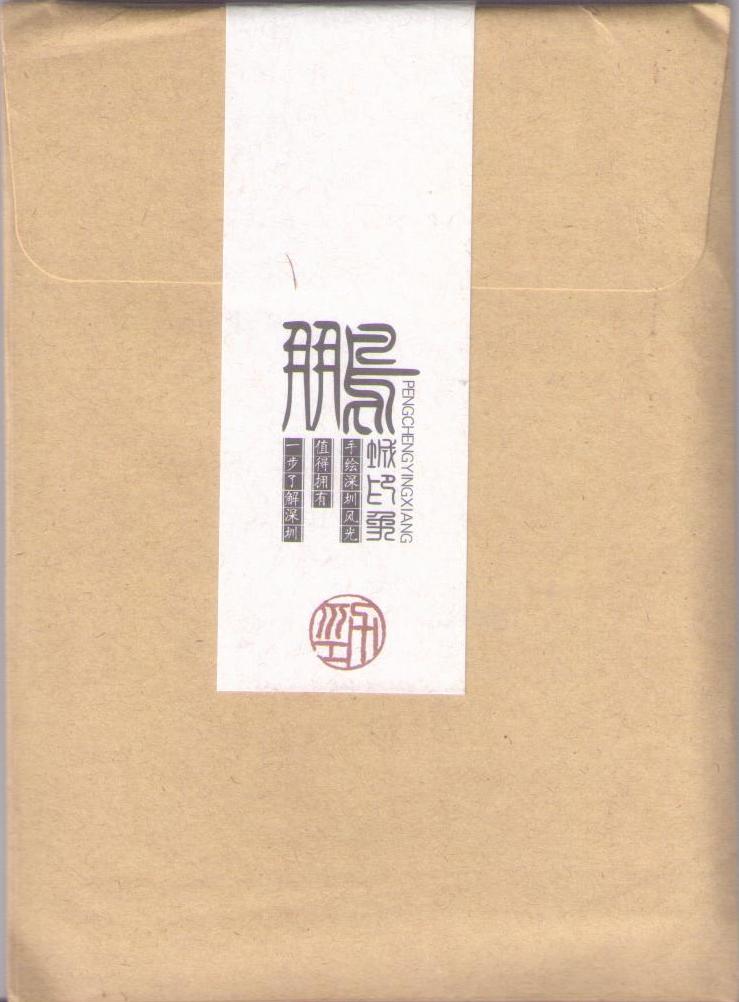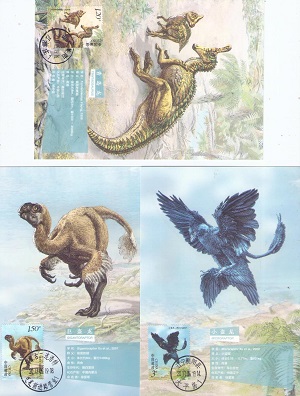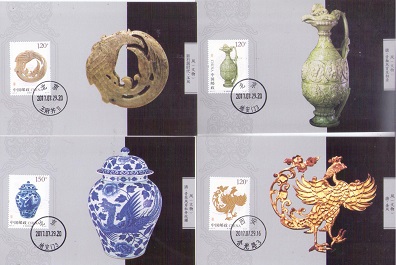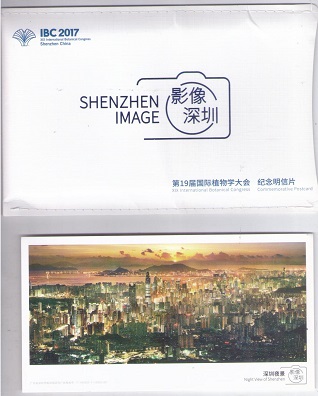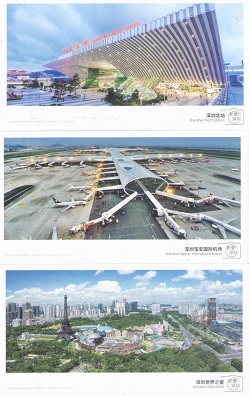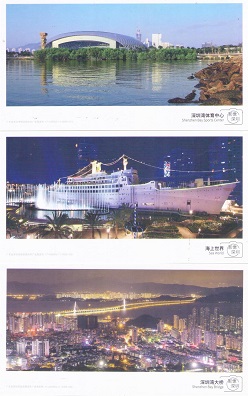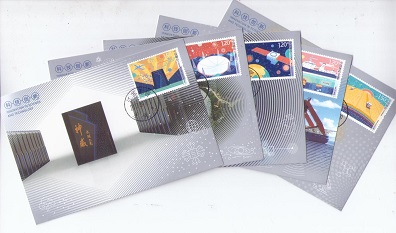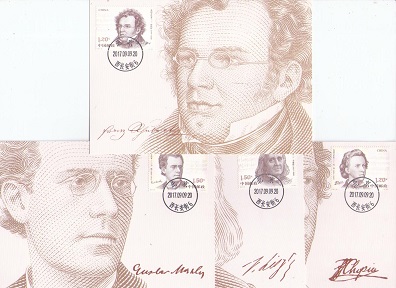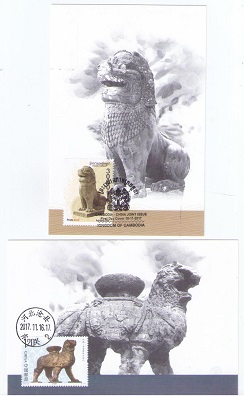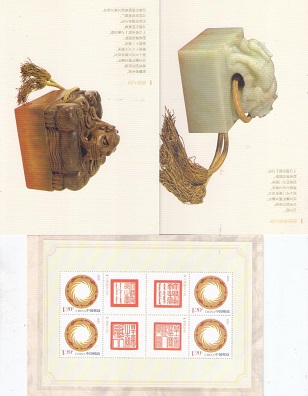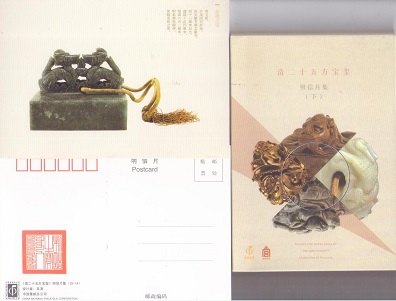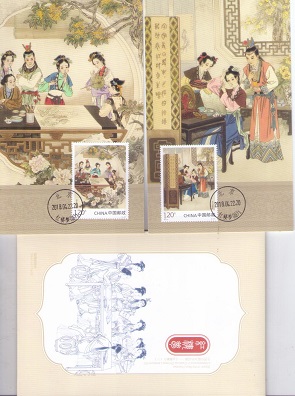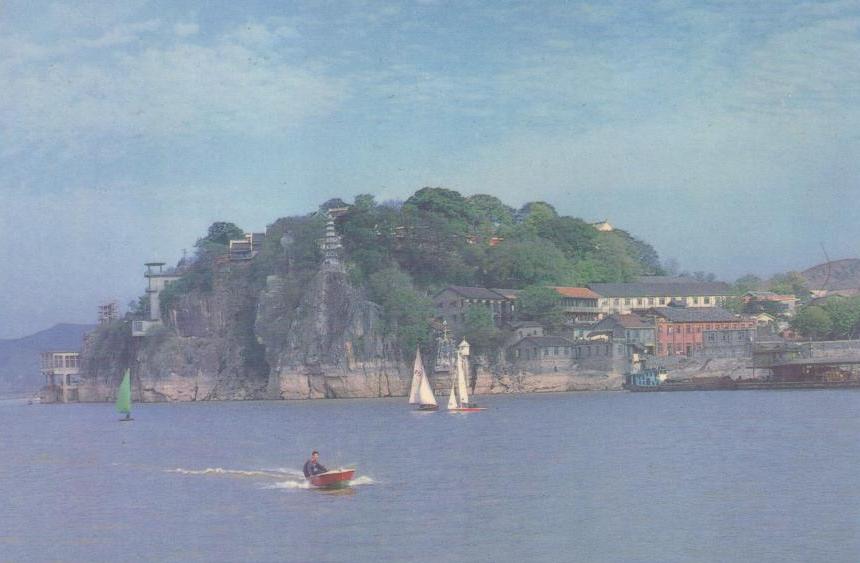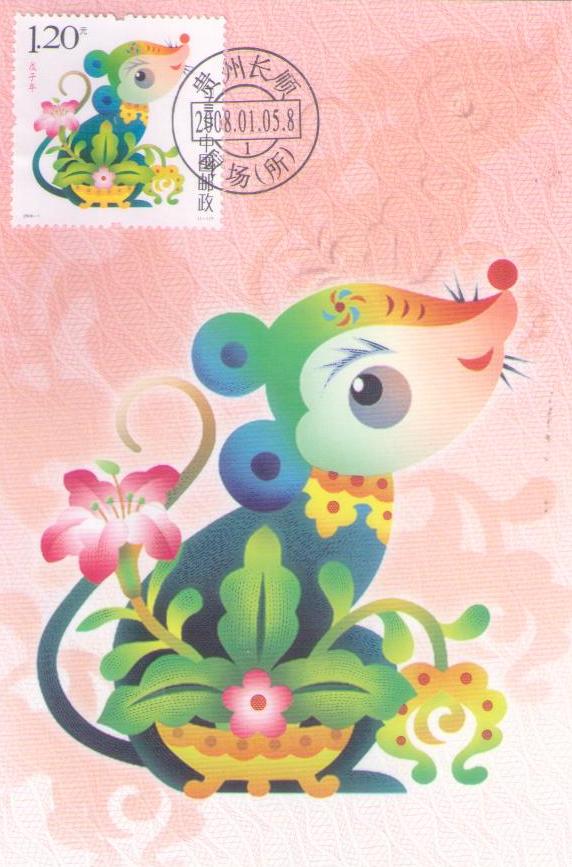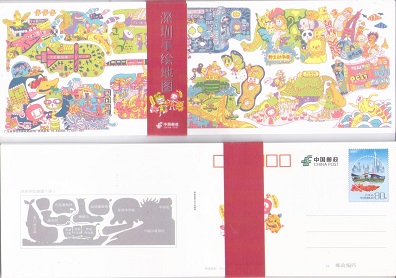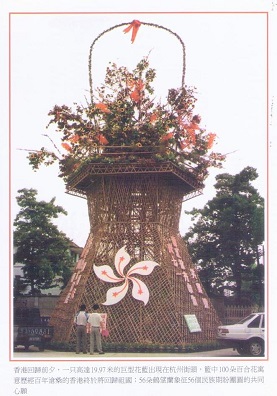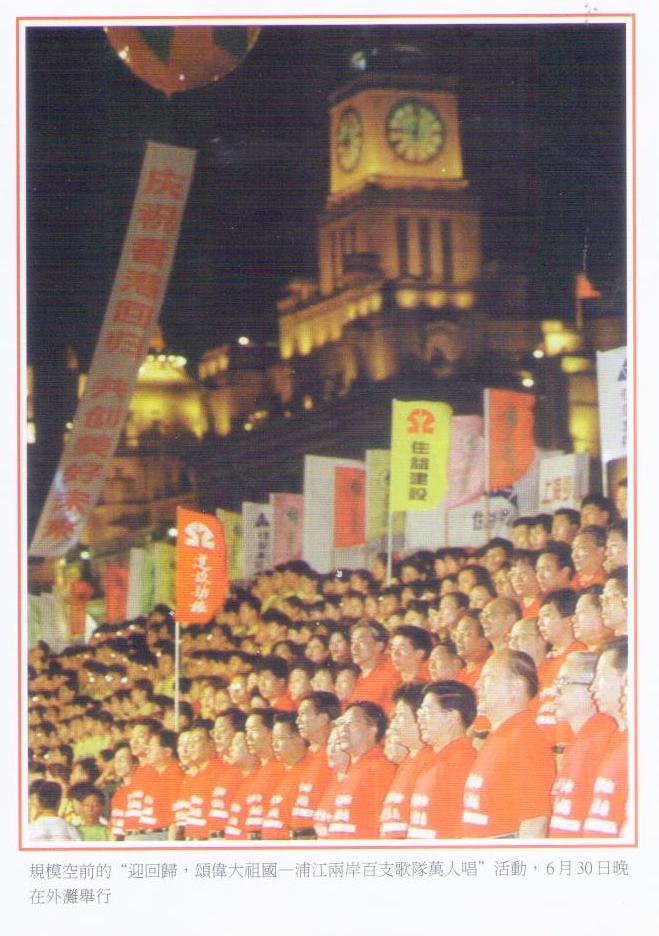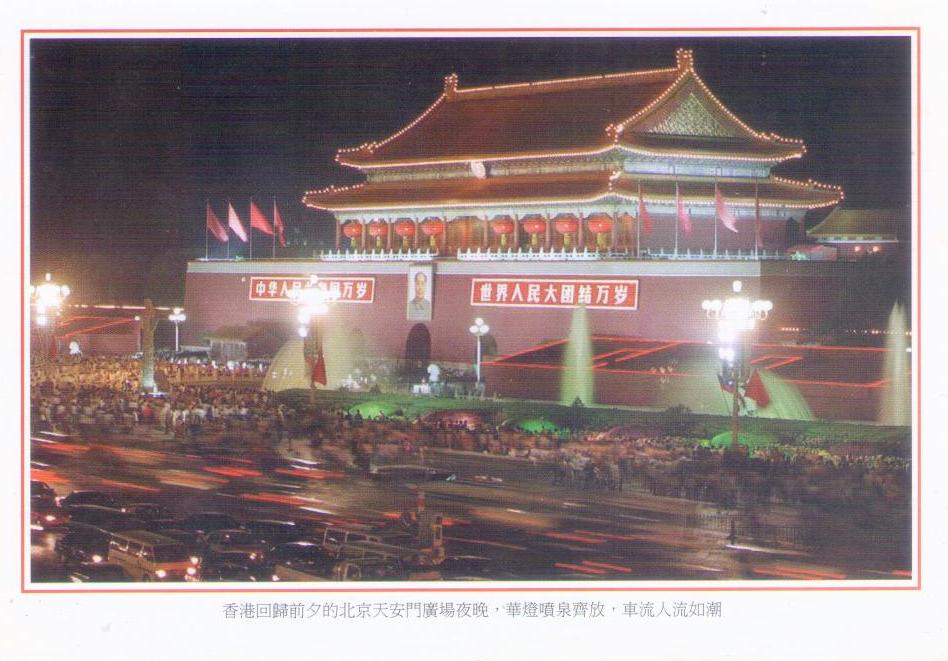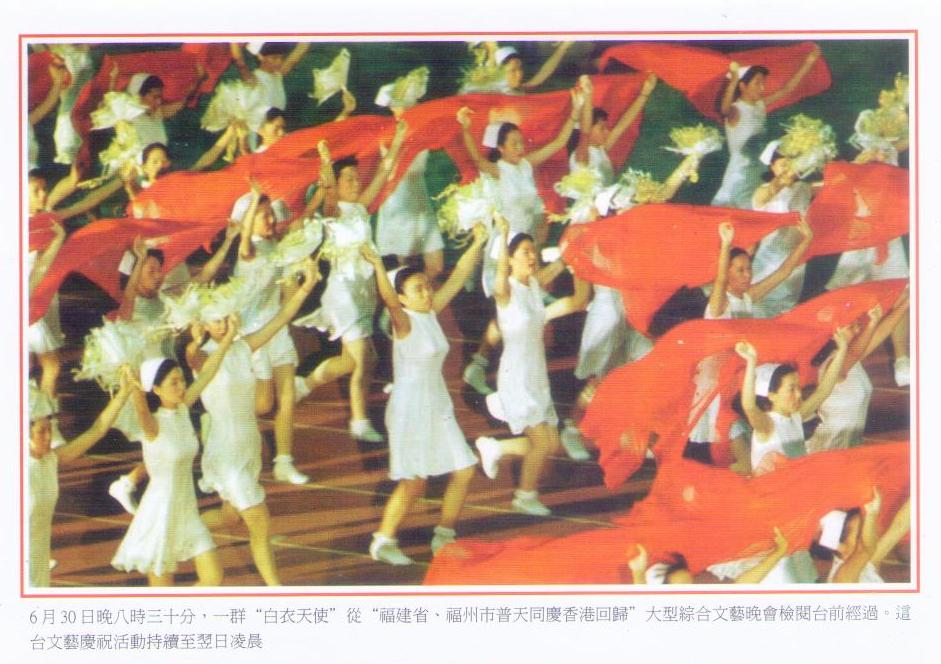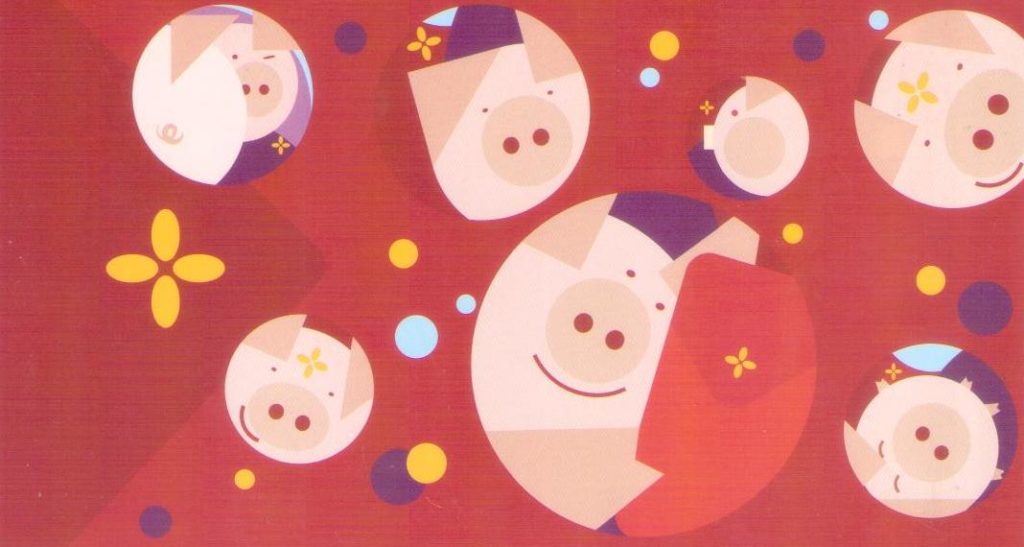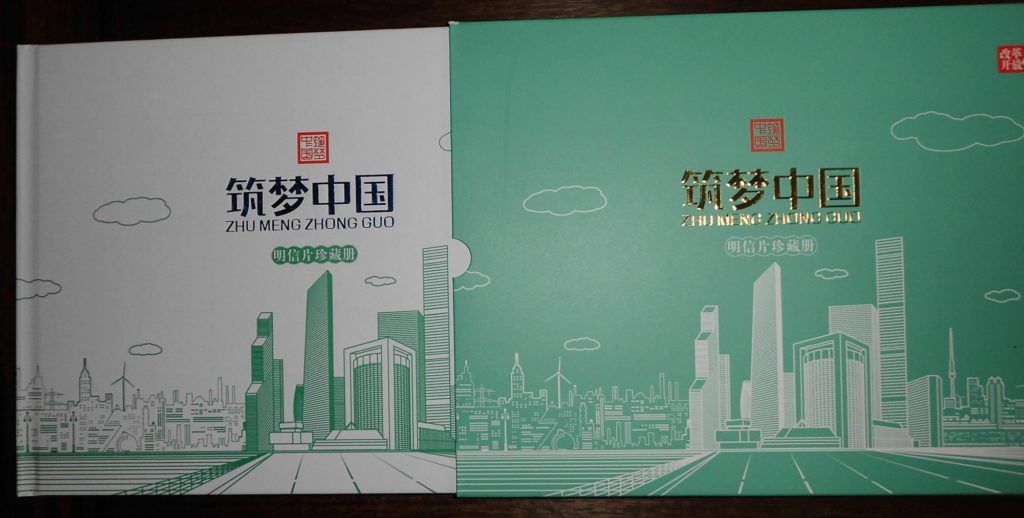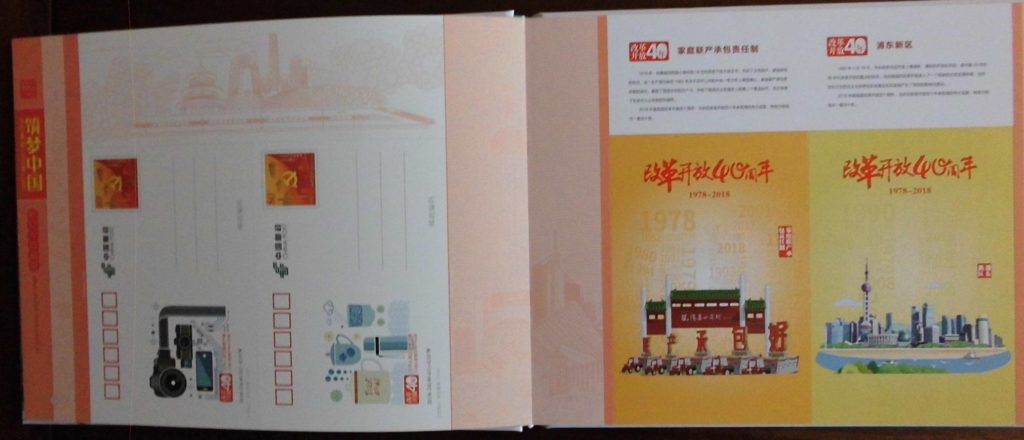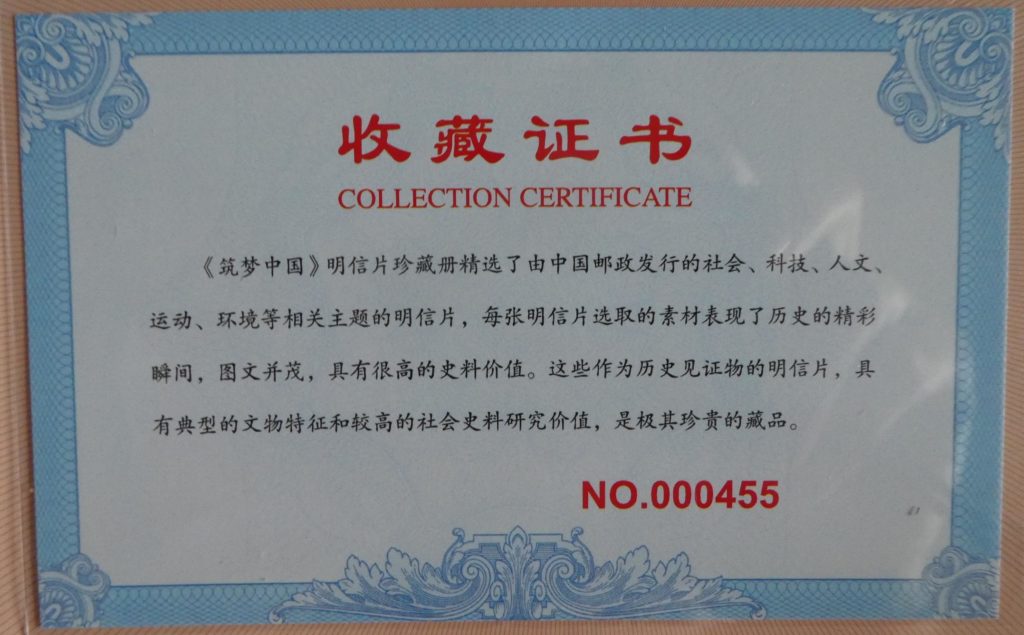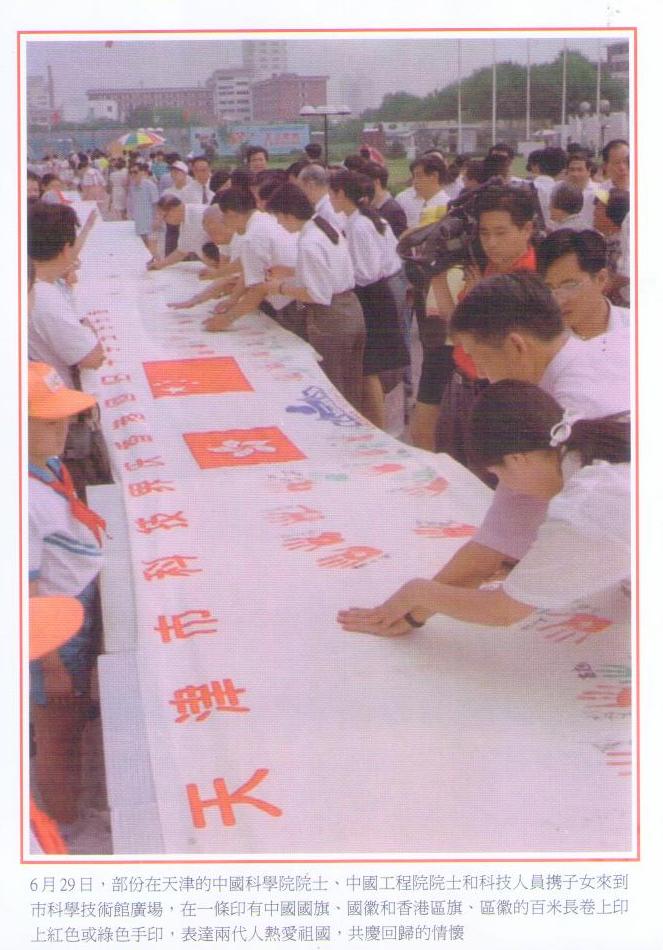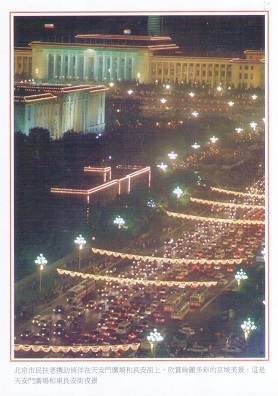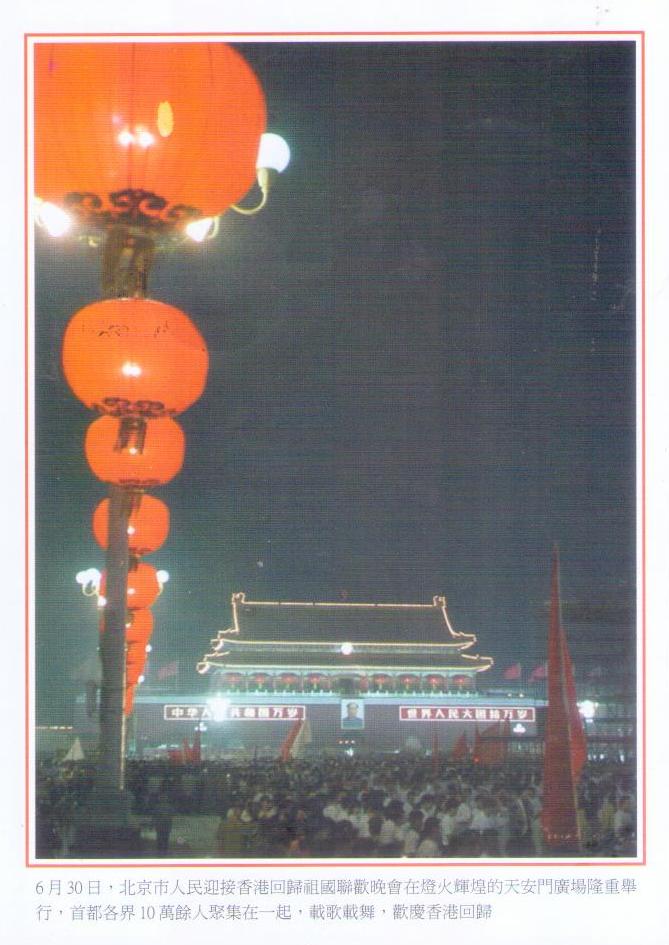-
Changbaishan, Er-dao-bai River
Up north in Jilin Province, and here on an unused postcard captioned in Chinese and English. Grade: 1
-
The 13th National Winter Games of the PRC
We ask you to look back to our entry #20307825 and the few that follow, showing a 2015 series of unused cards–blank on the reverse–commemorating specific anniversaries, events, or notable dates. Each card had pre-printed postage on the front. So now we have a similar series from 2016, each with an individual reference number as well as the series number, which in this case is JP 212. Unused. Grade: 1
-
Xi’an 2016 – 17th All-China Philatelic Exhibition
We ask you to look back to our entry #20307825 and the few that follow, showing a 2015 series of unused cards–blank on the reverse–commemorating specific anniversaries, events, or notable dates. Each card had pre-printed postage on the front. So now we have a similar series from 2016, each with an individual reference number as well as the series number, which in this case is JP 213. Unused. Grade: 1
-
The 110th Anniversary of Southwest University
We ask you to look back to our entry #20307825 and the few that follow, showing a 2015 series of unused cards–blank on the reverse–commemorating specific anniversaries, events, or notable dates. Each card had pre-printed postage on the front. So now we have a similar series from 2016, each with an individual reference number as well as the series number, which in this case is JP 214. Unused. Grade: 1
-
The 80th Anniversary of the Victory of the Long March …
We ask you to look back to our entry #20307825 and the few that follow, showing a 2015 series of unused cards–blank on the reverse–commemorating specific anniversaries, events, or notable dates. Each card had pre-printed postage on the front. So now we have a similar series from 2016, each with an individual reference number as well as the series number, which in this case is JP 215. Unused. Grade: 1
-
BWF Thomas and Uber Cup Finals 2016
We ask you to look back to our entry #20307825 and the few that follow, showing a 2015 series of unused cards–blank on the reverse–commemorating specific anniversaries, events, or notable dates. Each card had pre-printed postage on the front. So now we have a similar series from 2016, each with an individual reference number as well as the series number, which in this case is JP 216. Looking for a badminton postcard? Here it is. Unused. Grade: 1
-
WFRS Regional Convention
We ask you to look back to our entry #20307825 and the few that follow, showing a 2015 series of unused cards–blank on the reverse–commemorating specific anniversaries, events, or notable dates. Each card had pre-printed postage on the front. So now we have a similar series from 2016, each with an individual reference number as well as the series number, which in this case is JP 217. Are you wondering what WFRS stands for? World Federation of Rose Societies. Unused. Grade: 1
-
2016 Philatelic Week
We ask you to look back to our entry #20307825 and the few that follow, showing a 2015 series of unused cards–blank on the reverse–commemorating specific anniversaries, events, or notable dates. Each card had pre-printed postage on the front. So now we have a similar series from 2016, each with an individual reference number as well as the series number, which in this case is JP 218. Unused. Grade: 1
-
The 1400th Anniversary of Yunju Temple in Fangshan District of Beijing
We ask you to look back to our entry #20307825 and the few that follow, showing a 2015 series of unused cards–blank on the reverse–commemorating specific anniversaries, events, or notable dates. Each card had pre-printed postage on the front. So now we have a similar series from 2016, each with an individual reference number as well as the series number, which in this case is JP 219. Unused. Grade: 1
-
The 70th Anniversary of Jilin University
We ask you to look back to our entry #20307825 and the few that follow, showing a 2015 series of unused cards–blank on the reverse–commemorating specific anniversaries, events, or notable dates. Each card had pre-printed postage on the front. So now we have a similar series from 2016, each with an individual reference number as well as the series number, which in this case is JP 220. Unused. Grade: 1
-
Silk Road (Dunhuang) International Cultural Expo
We ask you to look back to our entry #20307825 and the few that follow, showing a 2015 series of unused cards–blank on the reverse–commemorating specific anniversaries, events, or notable dates. Each card had pre-printed postage on the front. So now we have a similar series from 2016, each with an individual reference number as well as the series number, which in this case is JP 221. Unused. Grade: 1
-
Drama Shines in China and the West – Tang Xianzu and Shakespeare
We ask you to look back to our entry #20307825 and the few that follow, showing a 2015 series of unused cards–blank on the reverse–commemorating specific anniversaries, events, or notable dates. Each card had pre-printed postage on the front. So now we have a similar series from 2016, each with an individual reference number as well as the series number, which in this case is JP 222 (2-1). Unused. Grade: 1 (If you like this and 20307894, have both for $1.50)
-
Drama Shines in China and the West – Tang Xianzu and Shakespeare
We ask you to look back to our entry #20307825 and the few that follow, showing a 2015 series of unused cards–blank on the reverse–commemorating specific anniversaries, events, or notable dates. Each card had pre-printed postage on the front. So now we have a similar series from 2016, each with an individual reference number as well as the series number, which in this case is JP 222 (2-2). Unused. Grade: 1 (If you like this and 20307893, have both for $1.50)
-
Shenzhen, linked city view (set)
Nine unused, joined cards measuring about 52″ in length when fully extended. It’s a sweeping, panoramic snapshot in time, anchored on the right by a statue of the “Father” of Shenzhen, Deng Xiao-ping. Issued in 2011 by China Post, each individual card has coloured, pre-printed postage. Grade: 1
-
Pengchengyingxiang (sealed set)
We rarely do this, but now’s a good time for it. This is a sealed set that we sourced from China Post in Shenzhen in 2017. Because it’s sealed in the original packing, we do not know how many cards are inside (our estimate: 10, but no guarantee) or what they’re about. A Google search only hints that these are probably art-related. If we knew, the price would be double. But we don’t, so it isn’t. Implied Grade: 1
-
Chinese Dinosaurs (Maximum Cards) (set of six)
Nice set of six (otherwise unused) engraved maximum cards, issued by China National Philatelic in May, 2017. Our scan shows you three of the six cards in the set. Western names, but all other captioning on these dinosaur postcards is in Chinese. Grade: 1
-
Art (Maximum Cards) (Set of six)
Our scan shows you four of the six cards in this set, issued by China National Philatelic in 2017. The other two cards are in a similar spirit, and there’s a cardboard cover (not shown). Somewhat unusually, postmarks are not all the same. Unused. Grades: 1
-
Shenzhen Image (set of 19)
You could ask — as we initially did — why only 19 cards in the set, of course one must be missing. But not so. This is deliberate, because the set was issued in 2017 for the XIX International Botanical Congress. And what a set it is: unused, postage pre-printed 4″ x 7-1/2″ cards with impressive views of modern day Shenzhen’s various attractions. The scan for this entry 20307899A shows the sort of vinylized cover and one of the cards. Scans B and C show other cards for different categories. Disclosure: we live right across the border from Shenzhen and didn’t know half of these places existed. Two sets are available. Grades: 1
-
Shenzhen Image (set of 19) – three cards
See 20307899A.
-
Shenzhen Image (set of 19) – three more cards
See 20307899A. Remember, the price is for the whole set, not just these three cards.
-
Innovation in Science and Technology (Maximum Cards) (set of five)
We did our best to show you parts of all five cards in this 2017 set MC-118 from China National Philatelic Corporation. There’s also a cardboard cover (not shown). Grade: 1
-
Composers (Maximum Cards) (set of four)
The scan shows one full card and parts of the other three in this unused set MC-117 from 2017. If the signatures aren’t clear, you have Franz Schubert, Gustav Mahler, Frederic Chopin, and Franz Liszt. Why these four? Why does China do this? Only they know. Grade: 1
-
Cambodia/PR China joint issue (Maximum Cards) (set of two)
Issued in 2017 with (PR) China National Philatelic as the lead sponsor, each of the two maximum cards in this set has a stamp and postmark corresponding to the correct country. It’s PRC set MC-119. Unused. Grade: 1
-
Twenty-Five Royal Seals of the Qing Dynasty (Part One) (first 13 of set of 25)
This is Part One of a two-part set (see also our entry 20307903B), which must be sold together. Part One contains 13 unused cards, of which we show two as examples here, plus one panel of mint stamps (also in our scan). Now please move on to see the description for Part 2. The price we show here is for both parts together. Grade: 1
-
Twenty-Five Royal Seals of the Qing Dynasty (Part Two) (second 12 of set of 25)
First, please read what we wrote for entry 20307903A. This set includes the remaining 12 cards of seals, and one more panel of mint stamps. Our scan shows one sample front of a card, one sample reverse of a card, and the cardboard cover similar for both parts of the entire set. You would be buying both parts of this set together for the listed price. Grades: 1
-
Dream of the Red Chamber, a Masterpiece in Classical Chinese Literature (III) (set of four) (Maximum Cards)
This is a beautiful set of four maximum cards, issued by China National Philatelic in April 2018, of which our scan shows two pieces plus the cardboard cover. The other two cards are in a similar style. As a side note, Dream of the Red Chamber is one of the most famous (and most accessible) works of Chinese literature. Two sets are available. Grades: 1
-
Mt. Shizhong (Stone-Bell)
Mailed in 1992, but from Hong Kong, using six stamps and with partly legible postmark. Grade: 3
-
Mouse
There’s a considerable back-story to this unused maximum card, and we are absolutely unable to explain it. We consulted Hong Kong friends who said, in effect, nobody in Hong Kong now really understands this calendrical cycle well. It’s apparently an old tradition in Mainland China. Please don’t hold it against us that we can’t go much further than this, but the (Chinese-only) text on the reverse caption sounds something like “Mao Zi”. It’s China Post’s card MC(E)-9 and postmarked 2008 but only went on sale in the Shenzhen post office in 2018. Confused? Not just you! Grade: 1
-
Shenzhen, attractions (set of 4)
Kindly get your coffee because this description may take awhile. It’s a set of four unused cards, each measuring 4″ x 11-5/8″, so they are well oversized. The red paper wrap identifies this China Post product, from 2018, and our scan shows the front of one card (the other three are similar but with different places) and the reverse of another. All cards have pre-printed, coloured postage and a kind of “shadow” graphic further identifying most of what’s on the front. Clearly these cards fit many of our categories–in fact, they set the record–because Shenzhen is a city of about 15 million people and has everything. Grades: 1
-
Hangzhou, Hong Kong handover basket
In the runup to the handover of Hong Kong back to China in 1997, celebrations and festivities took place all over the country. This basket, showing Hong Kong’s symbolic Bauhinia flower, was in Hangzhou. We think. The card was mailed much later, from Shenzhen, using a postage meter. Grade: 1
-
Shanghai, Hong Kong handover festivities
In the runup to the handover of Hong Kong back to China in 1997, celebrations and festivities took place all over the country. This particular scene was in Shanghai. The card was mailed much later, from Shenzhen, using a postage meter. Grade: 1
-
Beijing, Hong Kong handover festivities
In the runup to the handover of Hong Kong back to China in 1997, celebrations and festivities took place all over the country. This particular scene was in Beijing’s Tiananmen Square. The card was mailed much later, from Zhangmutou, using three stamps and with two full postmarks . Grade: 1
-
Fujian, Hong Kong handover festivities
In the runup to the handover of Hong Kong back to China in 1997, celebrations and festivities took place all over the country. This particular scene was in Fujian Province (we think). The card was mailed much later, from Zhangmutou, using three stamps and with two full and one more partial postmarks. Grade: 1
-
2019 Lunar New Year lottery card (Year of the Pig)
Unused 4″ x 7-1/4″ card, the same in all material respects as other New Year cards from PRC in previous years. Grade: 1
-
Zhu Meng Zhong Guo
A hardcover book of 40 postcards in a cardboard cover measuring 1/2″x 8-3/4″ x 11-1/2″. Our scans A-C for this item show you, respectively, (A) the book as it slides into the cover; (B) sample of the fronts and reverse of the cards; and (C) a “Collection Certificate” inside the back cover. The cards all have pre-printed postage and are, of course, unused. Grade: 1
-
Zhu Meng Zhong Guo – sample cards
See description for 20307913A.
-
Zhu Meng Zhong Guo – certificate
See description for 20307913A.
-
1997 Handover of Hong Kong, depicting 29 June
Refer to a few recent entries (example: #20307911) and their descriptions. This was mailed from Shenzhen much later, with stamp and fully legible postmark. Grade: 1
-
1997 Handover of Hong Kong – parade
Refer to a few recent entries (example: #20307911) and their descriptions. This was mailed from Shenzhen much later, with stamp and fully legible postmark. Grade: 1
-
1997 Handover of Hong Kong – lanterns
Refer to a few recent entries (example: #20307911) and their descriptions. This was mailed from Shenzhen much later, with stamp and fully legible postmark. Grade: 1


